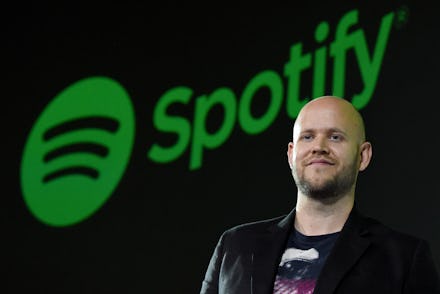Spotify may issue stock but skip the IPO. How that could avoid the SNAP effect... or not.

Teens' favorite companies are growing up. On March 2, we saw an initial public offering from Snapchat-maker Snap, and recent reports suggest investors will be able to buy BuzzFeed stock in the near future, too. Then, on Thursday morning, the Wall Street Journal reported that streaming service Spotify will likely pursue an IPO-like maneuver called a "direct listing" in 2017.
Direct listings are unusual, the Journal noted. Like an IPO, but not, they're usually favored by small companies, even ones just coming out of bankruptcy — and typically not $10-billion tech startups like Spotify, which is constantly in the news. Time called it a "crowdfunding" IPO. So how would it work?
A direct listing is like a no-frills IPO, minus the pizazz traditionally attached to a public offering. Before Snap IPOed, for example, the company traveled the country in what's known as a roadshow, hyping its founder Even Spiegel by calling him "once in a generation." The company hired huge investment banks like Morgan Stanley and Goldman Sachs to help them line up investors to buy shares. But SNAP's story so far has not had a happy ending: As of Thursday, shares sell near $4 lower than its opening price on March 2.
If Spotify proceeds with a direct listing, there could be far less initial fanfare. In direct listings, a company registers with the Securities and Exchange Commission and then sells shares of stock directly to the public instead of through brokers and banks. It's cheaper than a traditional IPO, but also doesn't have the same oomph, as Business Insider's James Cook pointed out.
That's a missed opportunity for big banks — which can make billions of dollars underwriting IPOs — but it arguably might be good for retail investors, who want to buy the stock for a fair, un-inflated price. After all, wealthy early investors who can access shares right before they appear on stock exchanges tend to get better prices than the "little guys," who can only buy in once prices rise. In SNAP's case, early investors paid only $17 a share, versus the $24 opening price for mom-and-pop investors.
"My sense is that a lot of the IPOs unfortunately are allocated to institutional investors," Nimay Mehta, a partner at Spotify investor Lead Edge Capital, said in a phone interview. "Maybe this is a way for retail investors to get access because they can't get shares in the IPO."
The idea is that a direct listing means prices are set organically — not by bankers looking to maximize their take — so you are less likely to see a "pop," which is when a stock price bounces quickly in its first day of trading. And a direct listing could be a smart strategy for Spotify, Mehta said, since the company doesn't really need the cash to expand that is typically raised by an IPO: Spotify raised about $1 billion just last year.
"IPOs are two things, right? They're financing events ... and then they're a path to liquidity," Mehta said. Liquidity is investor-speak for easily accessible cash. "So Spotify is foregoing the offering part ... I don't think it's management's reflection of how they feel about an IPO; it's that they don't need the money."
If you want to actually buy Spotify stock, there may be one hitch: As Mehta and others have pointed out, there's less precedent for direct listings — successful or not. And limited information is rarely an investor's friend.
In other words, it's not a sure bet to say the lack of a traditional IPO means you'll get a great deal buying stock in Spotify — which has also generated controversy and made an enemy of several musical artists who argue its business model is unfair to them.
Mehta suggested it's likely that the company and its investors will start to sell the stock in waves, gradually "unlocking" them to the public to keep the price from fluctuating too wildly. Regardless, as with any individual stock picking, it's best to hold off unless you're completely comfortable with the idea of losing all your money — since that is always a risk for stock investors.
For most individual investors, buying cheap, diversified index funds is usually going to be the safer way to grow your money without taking on so much risk.
Sign up for The Payoff — your weekly crash course on how to live your best financial life. Additionally, for all your burning money questions, check out Mic's credit, savings, career, investing and health care hubs for more information — that pays off.